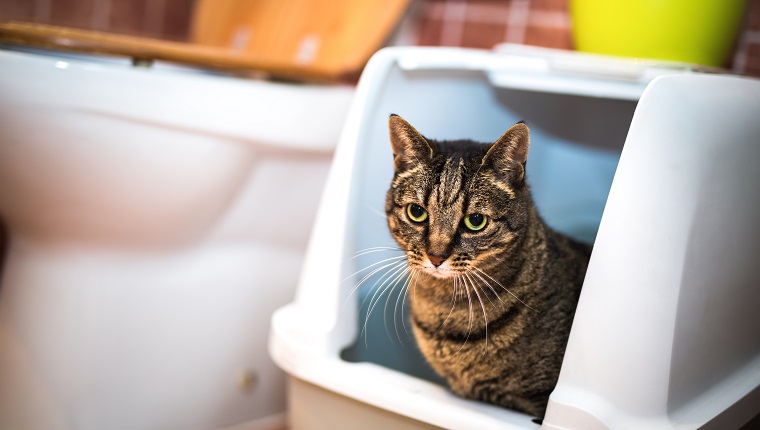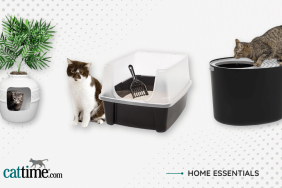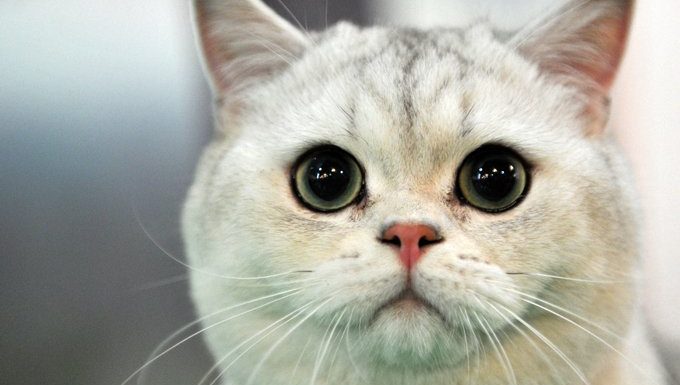
As concerned pet parents, one of the problems most of us will face at some point is how to deal with diarrhea in cats. There are many possible causes of diarrhea, but we really just want our poor kitties to feel better. So what should you do about it?
To start off, diarrhea refers to passage of feces that is loose, watery, and typically expelled in higher volume and frequency that normal. Basically, your cat’s poop is soft, runny, and coming out too quickly. It’s usually a symptom of some other problem.
Diarrhea is sometimes not a big concern, but it can be a sign of a serious issue. Regardless, it should always be treated, as untreated diarrhea in cats can lead to dehydration. If your cat’s diarrhea lasts more than two days or is particularly severe, you should consult your veterinarian.
Here are a few things you should know about diarrhea in cats.
Types Of Acute Diarrhea In Cats
Acute diarrhea in cats refers to diarrhea that comes on suddenly and severely. According to petmd.com,”diarrhea has four general reasons for occurring: osmotic imbalances, over secretion, intestinal exudation or motility disorders.”
What do those mean? Here’s an explanation of what happens with each of these types:
- Osmotic imbalances happen when there are too many food molecules in the intestines. These molecules draw water into the intestines, making stools loose and watery.
- Over secretion happens when the intestines are exposed to bacteria or toxic substances. The intestines begin to secrete too much fluid, resulting in diarrhea.
- Intestinal exudation happens when blood oozes through ulcers or breaks in intestinal tissue. It can vary in severity.
- Motility disorders refer to problems with the function of the intestines. The intestines are supposed to have muscles that contract and move contents through normally. When these muscles are under performing, it’s called peristalsis. When the muscles are over functioning, the intestines contract too quickly and don’t have enough time to absorb fluids, so the fluid stays in feces and becomes loose and watery.
Symptoms Of Diarrhea In Cats
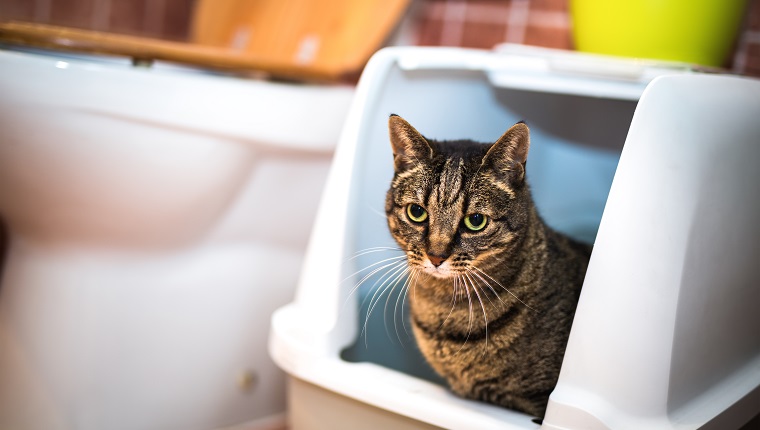
Diarrhea is, itself, a symptom of other issues. However, diarrhea in cats can vary in intensity, and cats may also show other symptoms.
If you see the following signs, it’s best to at least give your veterinarian a call and possibly schedule an appointment, especially if the symptoms become intense and concerning.
Here are some symptoms of diarrhea in cats:
- Watery stools
- Increased volume of feces, frequency, or both when defecating
- Accidents outside the litter box
- Vomiting
- Blood or mucus in stools
- Signs of straining while defecating
- Listlessness
- Loss of appetite
- Depression
- Abdominal pain (if your cat is vocalizing, resistant to touch, or having trouble lying down comfortably, they may be in pain)
- Fever
- Weakness
Causes Of Diarrhea In Cats
There are so many possible causes of your cat’s diarrhea. It’s difficult to say whether it’s a reason for concern. Diarrhea can be a symptom of anything from mild indigestion to life-threatening diseases.
If your cat is suffering from diarrhea for more than two days or if symptoms are severe, you should see a veterinarian so they can determine the cause and begin treatment.
Here are a few possible causes of your cat’s diarrhea:
- Eating toxic or spoiled food, especially from the garbage
- Dietary changes
- Having a sensitive stomach
- Food allergies
- Addison’s disease
- Liver, kidney, or pancreatic disease
- Ingesting foreign, nonfood items
- Intestinal blockage
- Infection from bacteria, viruses, fungi, or parasites
- Exposure to drugs, toxins, or poisons (medications, poison mushrooms, houseplants, etc.)
Diagnosis Of Diarrhea In Cats
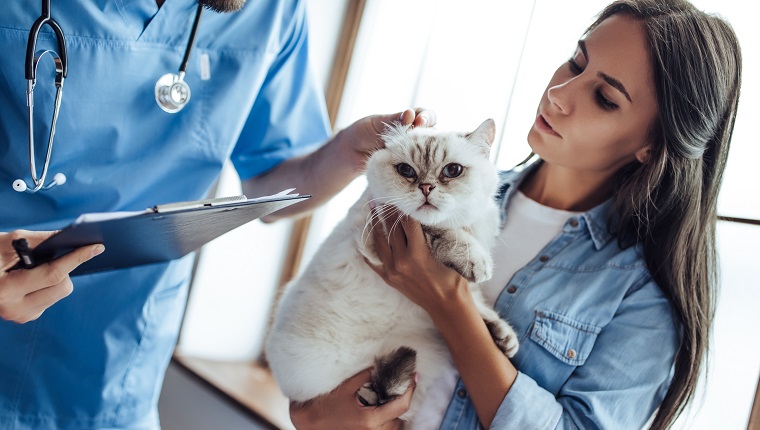
Diagnosing the cause of diarrhea in your cat will begin with you, the pet parent. It’s your job to record your cat’s symptoms, when the diarrhea started, what it looks and smells like, what your cat has been eating, how frequently your cat is having diarrhea, and your cat’s medical history.
All of this will help your vet find out what’s wrong. You should also scoop a sample of your cat’s poop — gross, but you need to do it — so your vet can run tests on it. The stool sample can be tested for infections like giardia, parvovirus, and cryptococcus, as well as parasite eggs.
When you arrive at the vet, your cat will get a complete physical exam. The vet will likely take a blood test to find out what chemicals are present, your cat’s blood count, and your cat’s electrolyte level.
You and your vet will want to keep an eye out for signs of dehydration. The blood test will help rule out problems with the pancreas and check the levels of vitamins normally absorbed by the intestines. The vet may consider performing an endoscopy.
The vet will also take a urinalysis to test for infections and diseases. If the vet suspects your cat has swallowed something that’s blocking the gastrointestinal tract, they may take an X-ray.
Treatment Of Diarrhea In Cats
The good news is that many cases of mild to moderate diarrhea in otherwise healthy cats can usually be treated with fasting. Ask your veterinarian first. They will likely advise you to withhold food for twelve to 24 hours while providing unlimited access to water to prevent dehydration.
This usually allows your cat’s digestive tract to right itself. Bland food, such as cooked rice and chicken, can be reintroduced slowly when your vet tells you it’s okay.
If the diarrhea is more severe, you should go to the vet immediately. The vet will begin treatment for dehydration with fluid therapy to replenish electrolytes. They may give your cat potassium supplements.
Treatment from there will depend on your vet’s diagnosis. Once they find the cause, they will prescribe appropriate treatment.
For example, they may use surgery to remove intestinal blockages or foreign objects. They may prescribe drugs to treat infections, anti-secretory drugs, or dewormers if worms are detected.
After Care & Prevention
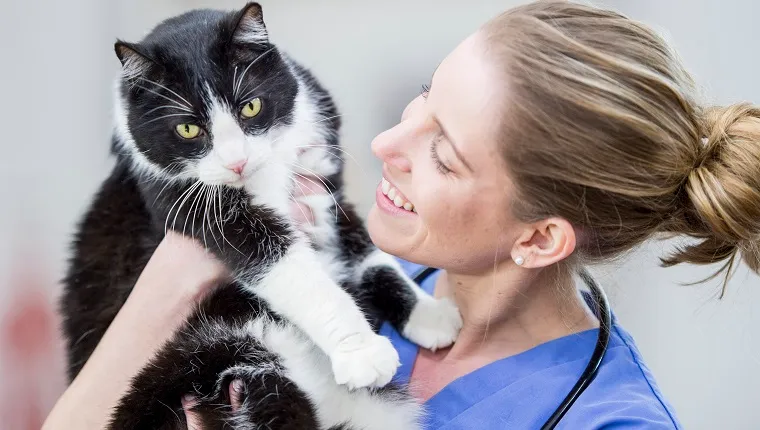
Make sure you follow your vet’s advice for treatment. If your vet prescribes medication, use it for the full duration of the prescription. Don’t stop just because symptoms have cleared up unless your vet tells you to do so. Give your cat plenty of water as they recover.
Protect your cat from any dangerous foods or foreign objects that they might eat. Keep your garbage secure, supervise them if they go outside, and keep their litter box clean, as feces can harbor bacteria. Keep up with vaccinations and regular vet visits.
Avoid inappropriate foods, and change their diet if necessary. Talk to your vet about preventative care for your cat.
It’s also important to note that some infectious diseases that cause diarrhea in cats can cross species and infect humans, too. Always take precautions when cleaning up after your cat has diarrhea.
Has your cat ever had diarrhea? How did you treat it? Let us know in the comments below!
